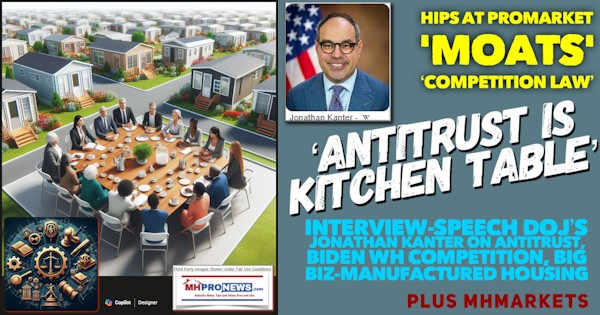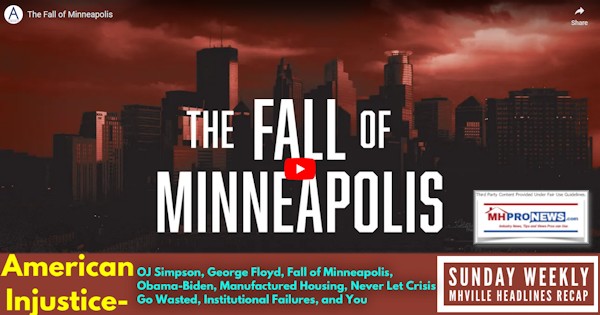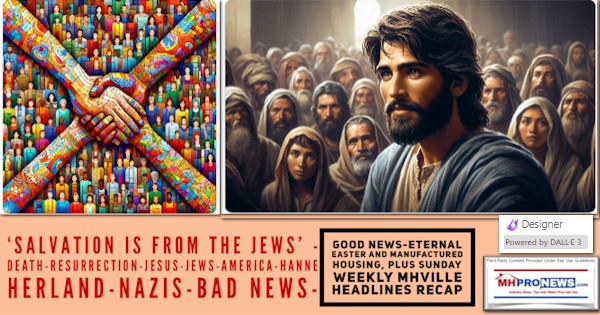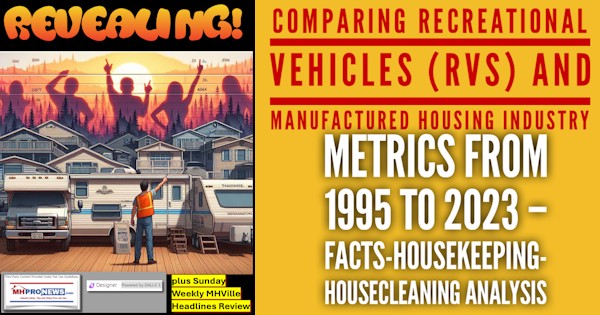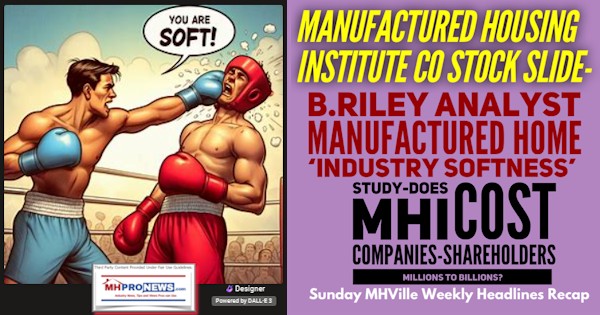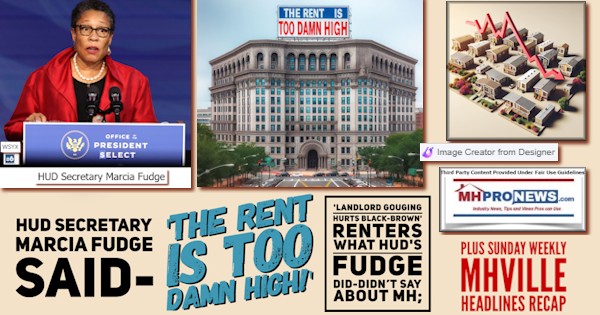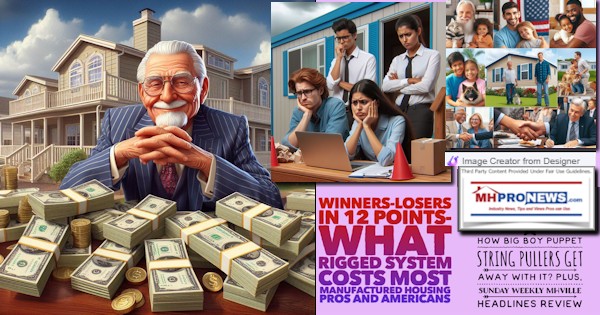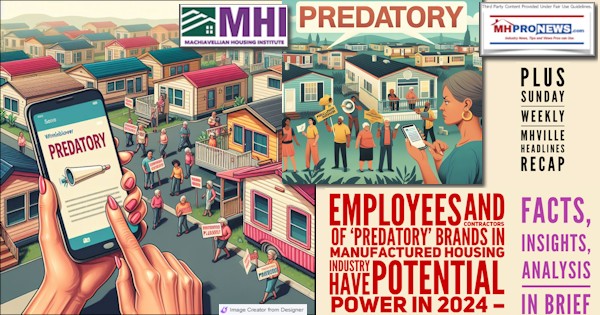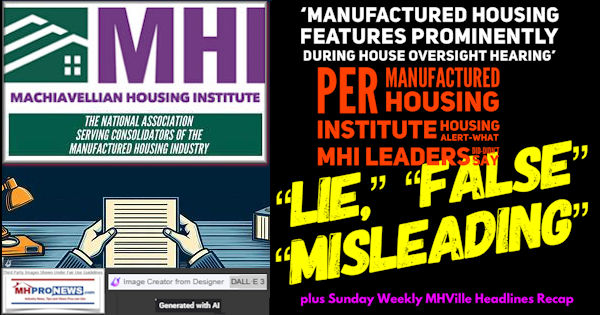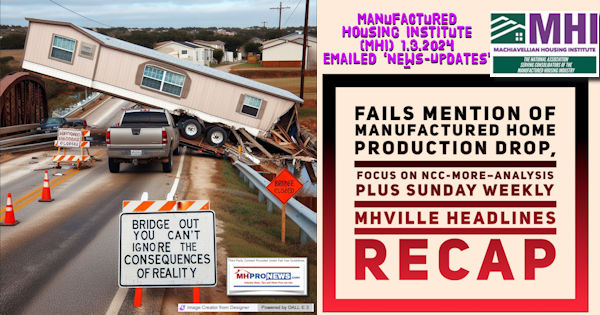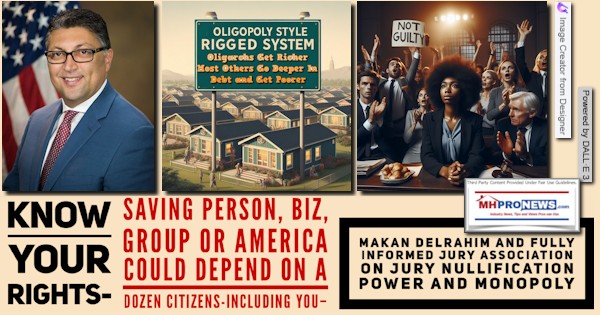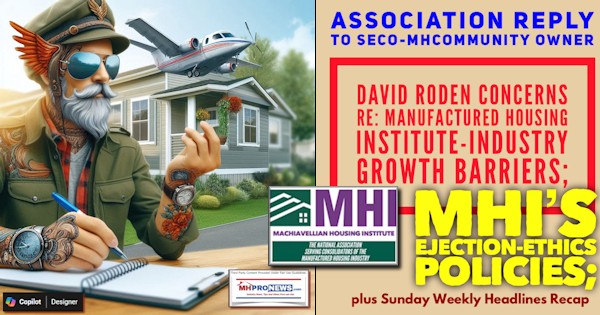
Mark Weiss, J.D., President and CEO of the Manufactured Housing Association for Regulatory Reform (MHARR) provided the following to MHProNews with regard to their response to the controversy sparked by SECO-linked land-lease manufactured home community owner David Roden. Roden recently asked Manufactured Housing Institute (MHI) staff leaders Lesli Gooch, Ph.D. (CEO), and Mark Bowersox (president) to act or explain why the manufactured housing industry hasn’t launched a campaign comparable to the GoRVing initiative successfully used by the recreational vehicle (RV) industry for decades, or the Got Milk? campaign used by the dairy industry. Neither MHI nor MHI-linked bloggers/publishers, per Copilot, responded to or reported the exchange, even though Roden copied – and thus directly advised some industry publishers about his concerns. It is worth noting that MHProNews contacted them too.
Given their lack of response, MHProNews double checked the MHI website and hereby provides below MHI’s events and ‘code of ethical conduct’ policies.
- Roden, and others who attend SECO, may be surprised to learn that apparently MHI considers their SECO meeting to be ‘an MHI event.’ More on the significance of that in Part II.
- In Part III of this article is MHI’s so-called Code of Ethical Conduct, with both of those items per MHI’s website on 6.4.2024.
- Part IV is our Sunday Weekly MHVille Headlines in Review (or recap, etc. We switch that up for the freshness of it).
- Part V is our Postscript with additional information with more MHProNews analysis and commentary.
Part I – Per MHARR, their response to the David Roden email (see Roden’s brief but interesting email on the Masthead, linked in Part IV below).

Thank you for sharing the below information, as well as your thoughts on the need to expand the production and use of affordable, mainstream manufactured homes – the most important issue that the industry, its members and its representatives face today. The points that you raise are crucial and warrant thoughtful consideration. Given the fact that MHARR has been raising the very same points for some time now, we feel compelled to share with you our views and suggestions regarding these matters.
While we agree that a positive public presence (via paid marketing, advertising or otherwise) is important to the well-being and future growth of the industry, there are, unfortunately, significant other factors that have – and continue — to suppress the industry and must be addressed. Those factors, which have a nation-wide impact, not only suppress the industry organically in the private housing market, but also prevent federal, state and local affordable housing spending and other related programs from “reaching the ground” with respect to manufactured housing. Thus, while such aggregated spending on – and promotion of – affordable housing stands at historically high levels, those dollars do not ultimately benefit either manufactured housing consumers or industry members.
As MHARR has documented and analyzed (please see attachment), the principal bottlenecks that have suppressed the industry over the past two-plus decades, are organic to the acquisition and utilization of HUD Code manufactured housing and do not relate to either the quality or aesthetics of today’s modern manufactured homes, both of which – since the enactment of the Manufactured Housing Improvement Act of 2000 (2000 Reform Law) — are the best they have ever been.
Rather, the bottlenecks that the industry and its consumers face today are discriminatory and exclusionary zoning mandates, which prevent or severely restrict the placement of HUD Code manufactured homes in many areas (and also prevent or severely restrict the development and/or expansion of manufactured housing land-lease communities), as well as financing inequity resulting from the failure of Fannie Mae and Freddie Mac to implement the Duty to Serve (DTS) mandate of the Housing and economic Recovery Act of 2008 (HERA) with respect to the personal property loans which finance nearly 80% of the industry’s most affordable homes. This failure, in particular, affects both the availability of manufactured home consumer financing and financing rates, which are higher than necessary due to the absence of securitization and secondary market support. These inequities, moreover, will be significantly aggravated by impending discriminatory federal energy regulations that will impose disproportionate cost burdens on HUD Code homes and HUD Code consumers.
Therefore, and leaving aside the pending energy rule for the moment, the reality is that the dual bottlenecks of zoning exclusion and lack of parity in consumer financing have been decimating our industry and driving away consumers in significant numbers for the past two-plus decades. This is unacceptable and must be rejected by every member of the manufactured housing industry. Consequently, the industry’s post-production sector (i.e., retailers, communities, developers, finance companies and insurers) – in particular – must aggressively and competently fight to remove these bottlenecks, so that the industry can produce and market hundreds-of-thousands of affordable mainstream manufactured homes annually, as MHARR has consistently advocated.
Although MHARR, as a manufacturer-financed organization, does not receive funding from the industry’s post-production sector, where these principal bottlenecks reside, our members – and MHARR as an organization – have bent over backwards to address and seek to remedy these bottlenecks. More is needed, however, from the industry’s post-production sector in order to achieve the necessary positive results.
David, you asked for an explanation in straightforward terms of what needs to be done. Here it is. The bottlenecks or roadblocks that the industry faces have already been addressed by Congress in straightforward and powerful laws that are already on the books. The industry and the post-production sector in particular need to relentlessly push for these laws to be enforced and the roadblocks to be cleared away.
Given the continuing importance of the two issues noted above, we hope that you don’t mind us sharing this communication with our other industry colleagues.
Best regards,
Mark
Mark Weiss
President and CEO
Manufactured Housing Association for Regulatory Reform
1331 Pennsylvania Avenue, N.W.
Suite 512
Washington, D.C. 20004
Tel. (202) 783-4087
Fax: (202) 783-4075
MHARRDG@aol.com
##
Part II – MHI’s Code of Conduct
(MHProNews Note: It is worth noting that on the date of this download from the MHI website, this document lacks the MHI logo, but it does refer to MHI repeatedly. Highlighting in what follows is added by MHProNews).
Code of Conduct
-
- This Code of Conduct applies to all MHI members and anyone who attends an MHI event. MHI events include, but are not limited to, all meetings, conferences and symposia, assemblies, receptions, workshops, exhibits, gatherings, and any other forum that is (1) organized, hosted, or sponsored in whole or part by MHI, (2) located on MHI premises, or (3) related to MHI business of any kind.
- MHI strives to provide a safe, inclusive, harassment-free environment for everyone, regardless of gender, gender identity and expression, sexual orientation, disability, race, ethnicity, national origin, religion, beliefs, citizenship, age, or any other category protected by federal, state, or local law.
- MHI does not tolerate conduct that threatens, intimidates, or coerces another person.
- MHI expects members and event attendees to act in a legally appropriate, professional manner that promotes a positive and collegial atmosphere free from harassment and other unacceptable behavior. Members and event attendees are expected to act with courtesy and mutual respect towards others.
- No member or event attendee may engage in conduct that is discriminatory, abusive, vulgar, hateful, harassing, obscene, profane, sexually oriented, threatening, invasive of a person’s privacy or publicity, or otherwise violative of any law.
- Harassment is any improper or unwelcome conduct that might reasonably be expected or perceived to cause offense or humiliation to another person. MHI prohibits all harassment, including, but not limited to, harassment related to gender, gender identity and expression, sexual orientation, physical ability, physical appearance, ethnicity, race, national origin, political affiliation, age, religion.
- Sexual harassment is a specific type of prohibited conduct. Sexual harassment is any unwelcome conduct of a sexual nature that might reasonably be expected or be perceived to cause offense or humiliation, including but not limited to, unwanted physical touching or closeness, physical gestures that imply a sexual act or sexual anatomy, using vulgar words of a sexual nature, and unwelcome sexual flirtations or propositions. Sexual harassment may involve any conduct of a verbal, nonverbal or physical nature, including written and electronic communications, and may occur between persons of the same or different genders.
- Members and event attendees must stop any behavior in violation of this Code and must comply with this Code immediately.
- This code provides general guidelines and cannot cover every possible type of unacceptable behavior. MHI has the right, but not the obligation, to decide what conduct constitutes harassment.
- MHI reserves the right to take any appropriate action against a member or event attendee who engages in any form of discrimination, harassment, retaliation, or inappropriate behavior in violation of this Code.
- To the greatest extent allowed by law, MHI is not and will not be held responsible for any member or event attendee’s alleged violation of this Code or otherwise inappropriate or unlawful act. ##
MHProNews notes: to paraphrase aspects of the above, MHI can arguably decide that anything they don’t like is “harassment” or is “unacceptable behavior” at any meeting that simply has an MHI member as a sponsor.
Using that MHI definition, SECO is an MHI event, because MHI members are sponsors, and likely several people connected with MHI will attend.
So, if someone questioned an MHI staffer, for example, that might be deemed by MHI as ‘harassment’ based upon this so-called code of conduct, shown above – it is possible for MHI to threaten or engage in some sort of ‘legal’ response.
Because the language in their ‘code of conduct’ indicates that MHI alone asserts what they want to decide that they wish to enforce and what they don’t, this could be viewed as a thinly veiled form of cover to suppress free speech and avoid accountability. More on this below and in Part V too.
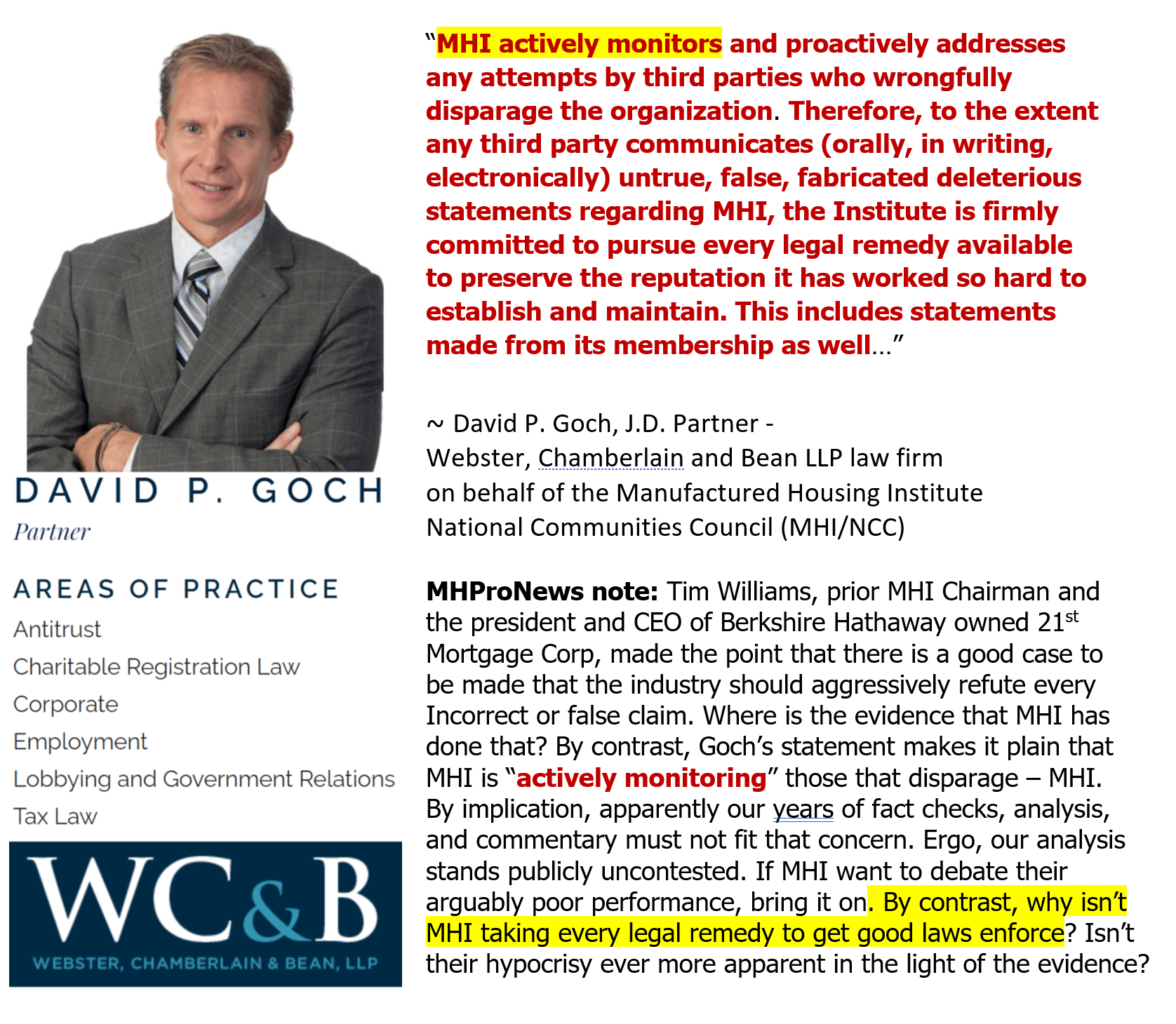
Part III – MHI’s Code of Ethical Conduct – per their website on 6.4.2024.

NCC Code of Ethics
Members of MHI’s National Communities Council agree to abide by its Code of Ethics, which include engaging in conduct that promotes and enhances the public image of manufactured housing and land-lease manufactured housing communities, and promoting positive customer and resident relations. …”
Per the downloaded MHI-NCC document is the following. Formatting is per the MHI document.
NATIONAL COMMUNITIES COUNCIL
CODE OF ETHICS
As a Member of the Manufactured Housing Institute, (“MHI”), and the National Communities
Council, (“NCC”), I subscribe to the principles set forth in the following Code of Ethics established
by the NCC:
- Members agree to engage in conduct and actions that promote and enhance the public image
of manufactured housing and land lease manufactured housing communities. - Members agree to promote positive customer and resident relations as an essential
responsibility. - Members agree to engage in conduct that respects the interests of customers,
residents, vendors, and the general public regarding the manufactured housing industry
and manufactured housing community lifestyle. - Members agree to conduct themselves in a professional, courteous, and considerate
manner in communications and interaction with other members, residents, vendors,
and the general public. - Members agree to adhere to applicable state and federal laws and regulations affecting
the manufactured housing industry. - Members agree to support MHI in an effort to advance the interests of the manufactured
housing industry, manufactured housing communities, and community operators. - Members agree to be bound by this NCC Code of Ethics, as well as the MHI Bylaws,
as a condition of membership. - If it is determined that a Member is not acting in accordance to this NCC Code of Ethics,
a Member may be expelled from NCC and MHI membership pursuant to NCC Operating
Procedures Section 5 and Article II, Section 5 of the MHI Bylaws.
In brief, our commentary on that is much the same as it was in our fisking of those assertions and remarks found in the report linked below.
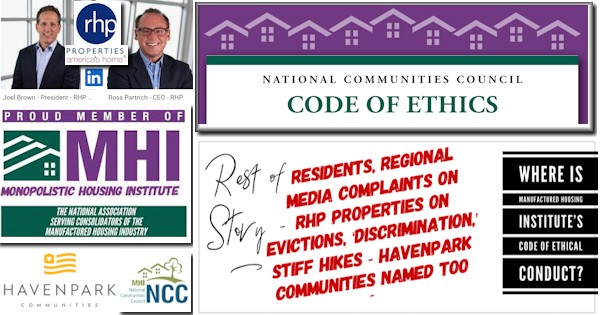
Based on recent data, June 2024 appears to be off to a stronger start than traffic in June 2023. Meaning, manufactured housing professionals – along with others who are peering into the curious and sometimes self-contradictory, and paltering world of MHVille – are as or more eager to understand the whys and wherefores behind the posturing and preening deployed by some in the industry.
As more Americans appear to be awakening to the sobering reality that leaders in business, media, and politics are often more concerned with spinning a useful narrative that telling their followers ‘the truth, the whole truth, and nothing but the truth,’ the factual, evidence-based, and common-sense (some would say “logical” while adding that emotions at times override people’s reasoning) reports with analysis that have made this platform the runaway #1 source for manufactured housing “Industry News, Tips, and Views Pros Can Use.” ©
With no further adieu, here is Part IV, our Sunday Weekly Headlines in review for 6.2 to 6.9.2024
Part IV
What’s New on MHLivingNews
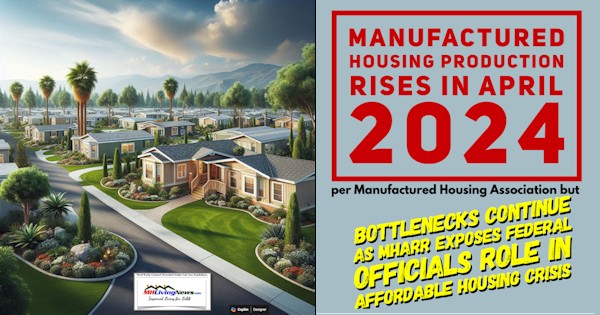
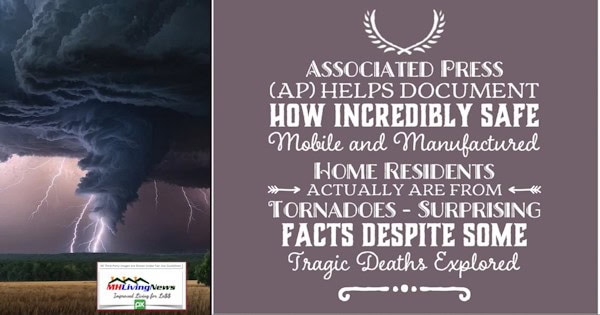
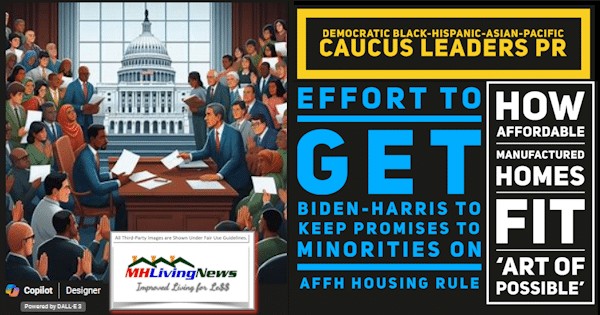
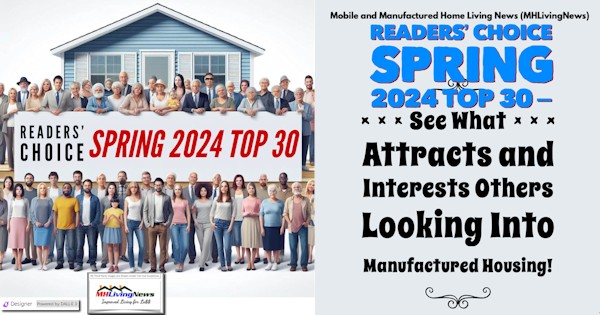
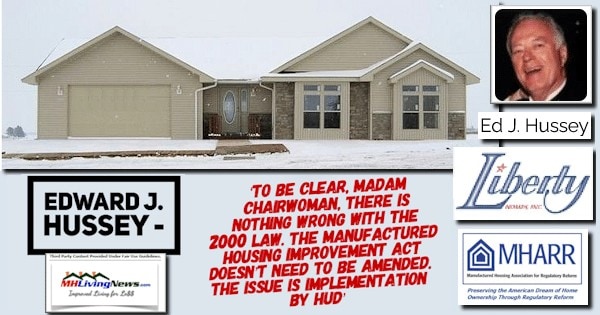
What’s New from MHARR

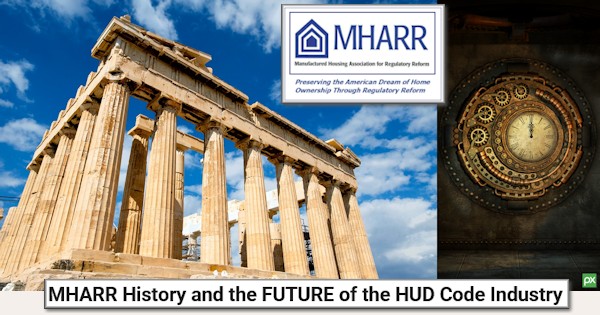
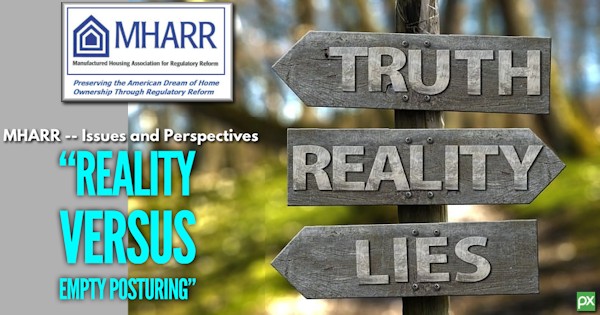
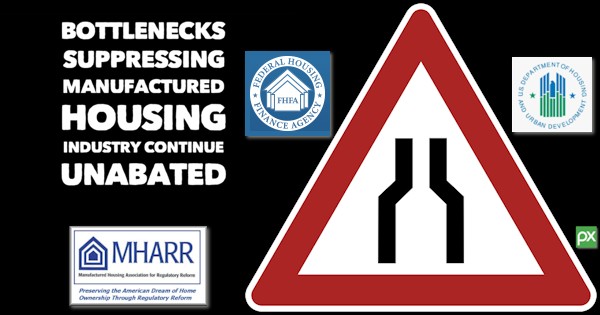
What’s New on the Masthead
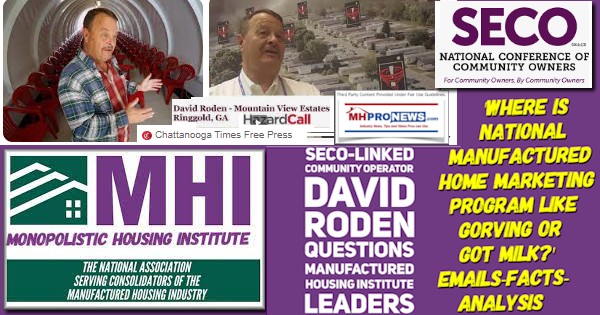
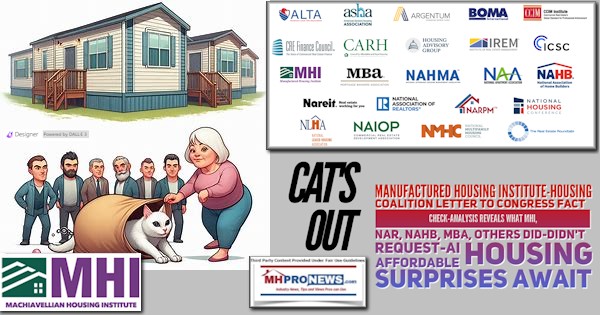
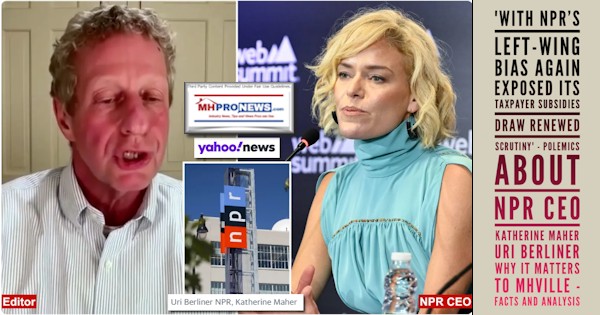

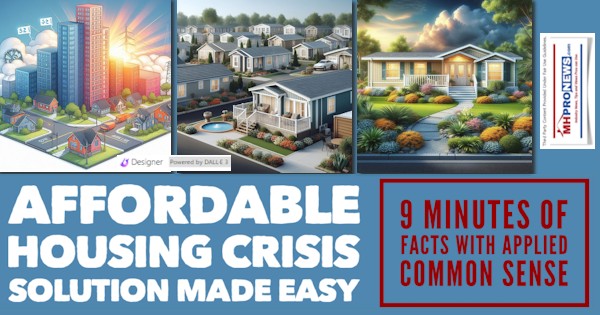
Select Items from bestselling author and global speaker (over 2 dozen countries) Tim Connor, CSP, Words of Wisdom
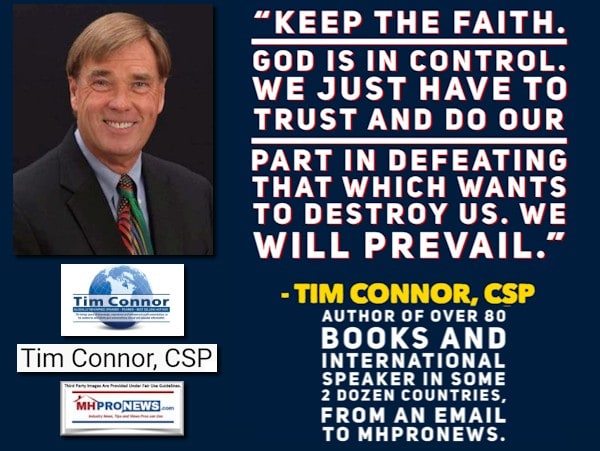

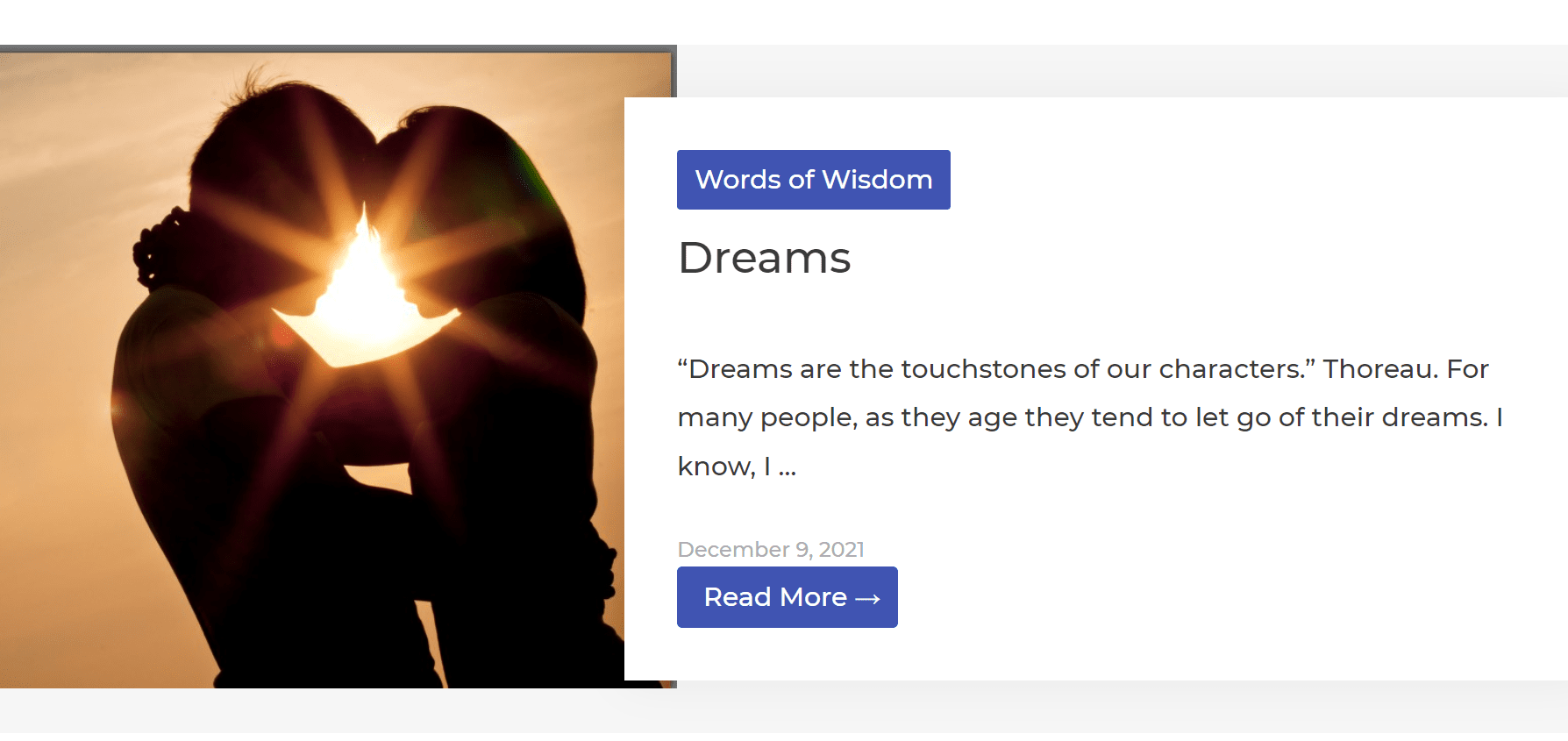
What’s New on the Daily Business News on MHProNews
Saturday 6.8.2024
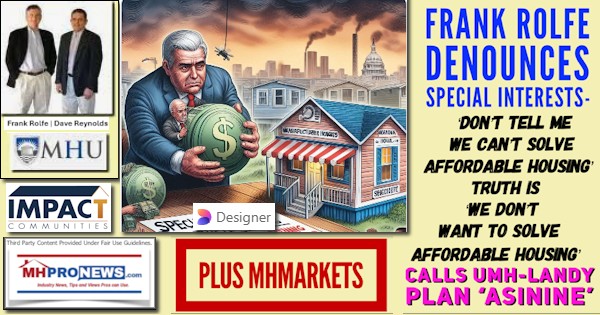
Friday 6.7.2024
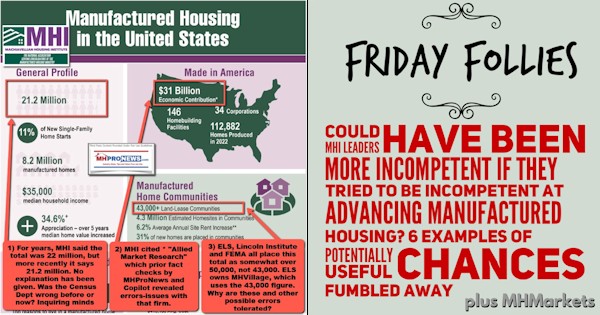
Thursday 6.6.2024
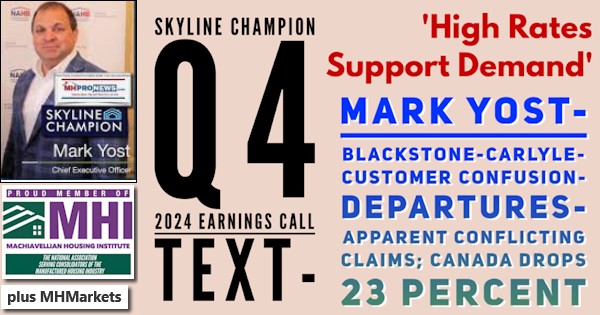
Wednesday 6.5.2024

Tuesday 6.4.2024
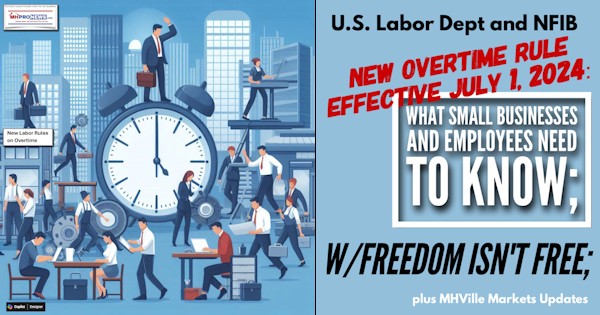
Monday 6.3.2024
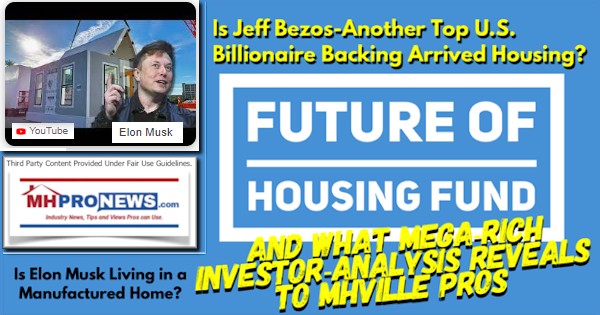
Sunday 6.2.2024
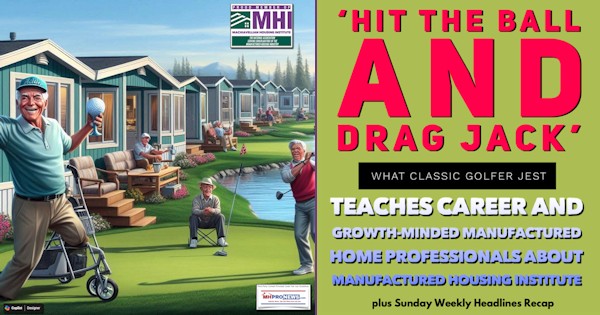
Part IV – Postscript with Additional Information plus More MHProNews Analysis and Commentary
SECO linked David Roden, owner of Mountain View Estates at 1325 Wilson Rd Rossville GA, fired off a polite yet apparently pointed broadside to numbers of Manufactured Housing Institute (MHI) linked entities and leaders as well as to the independent producer’s trade group, the Manufactured Housing Association for Regulatory Reform (MHARR).
About two weeks have elapsed since Roden’s inquiry, which copied blogger George Allen and the MHInsider. Yet as of 5.30.2024 at about 4:30 PM ET, there doesn’t appear to be a mention of Roden or his inquiry to MHI linked leaders, even though Roden personally advised MHInsider and Allen of his concerns by copying them in his message to MHI leaders. MHProNews reported that previously. On 6.8.2024, there is still no mention of Roden’s message to MHI by MHInsider, nor is there any mention of Frank Rolfe’s fascinating memo.
Roden sent the following email to the following individuals on 5/23/2024 2:51:18 PM Eastern Daylight Time under the subject line: “Is affordable housing possible anymore?”
- Lesli Gooch, Ph.D., CEO of the Manufactured Housing Institute (MHI)
- Mark Bowersox, President of MHI.
- Manufactured Housing Association for Regulatory Reform (President and CEO Mark Weiss, J.D.)
- Blogger and fellow SECO organizer George Allen,
- Byron Stroud – Skyline Champion (an MHI member).
- Spencer Roane, another SECO organizer.
- Darren Krolewski at MHVillage, owned by Equity LifeStyle Properties (which has an MHI board position) and is the parent company to MHInsider.
- Patrick Revere at MHInsider.
- Kurt Kelley, another MHI-linked quarterly trade publisher.
Roden and Rolfe each made significant points. Rolfe (see report linked here for details) said: “So don’t tell me “we can’t solve affordable housing” because the correct statement is “we don’t want to solve affordable housing.” Whatever hypocritical or other concerns may be raised by the “Frank and Dave” memo, that quoted point is not far from the bullseye. There are scores of professionals in and beyond manufactured housing who do not seem to want to solve the affordable housing crisis, at least, not at this time. Give Rolfe and Reynolds their due for raising that point.
Roden politely but pointedly asked in his own words, this notion. Let’s do an image and educational campaign to promote manufactured housing as an important part of the solution for the affordable housing crisis. And if we don’t do so launch such an effort as an industry (or via MHI as the self-proclaimed leading trade group), then explain to Roden what we can’t or won’t do so.
So, both of Roden and Rolfe have in this instance raised valid points.
Mark Weiss, J.D., President and CEO of MHARR made the following apt points in response to Roden:
- “While we [i.e.: MHARR] agree that a positive public presence (via paid marketing, advertising or otherwise) is important to the well-being and future growth of the industry, there are, unfortunately, significant other factors that have – and continue — to suppress the industry and must be addressed.”
- “Rather, the bottlenecks that the industry and its consumers face today are discriminatory and exclusionary zoning mandates, which prevent or severely restrict the placement of HUD Code manufactured homes in many areas (and also prevent or severely restrict the development and/or expansion of manufactured housing land-lease communities), as well as financing inequity resulting from the failure of Fannie Mae and Freddie Mac to implement the Duty to Serve (DTS) mandate of the Housing and economic Recovery Act of 2008 (HERA) with respect to the personal property loans which finance nearly 80% of the industry’s most affordable homes. This failure, in particular, affects both the availability of manufactured home consumer financing and financing rates, which are higher than necessary due to the absence of securitization and secondary market support. These inequities, moreover, will be significantly aggravated by impending discriminatory federal energy regulations that will impose disproportionate cost burdens on HUD Code homes and HUD Code consumers.”

MHProNews has reported and editorially stated for years, both before and since MHARR became a sponsor this site, that what MHI was doing superficially seemed to make little or no sense.
MHProNews attempted to work from within the MHI ‘system’ to accomplish what Roden asked for in his May 23, 2024 email. Off and on for some 7 years, MHProNews attempted to see image and educational efforts by MHI become part of the trade group’s routine activities.
- MHProNews advocated for robust enforcement of the MHIA and DTS while an MHI member.
- And while we were an MHI member, we often pointed to MHARR’s communications at and during MHI meetings as examples of thinking that seemed to be more logically consistent than MHI’s was.
- There was obviously no notable success at accomplishing those goals, but they are part of the record of this publication, should someone go back several years and see for themselves.
- That said, due to years of first-hand experience, it will not be surprising to the management of this platform if Roden’s effort also fails to get any movement, especially if his effort is a one-and-done emailed inquiry. If Roden (or anyone else) is to make progress, they will likely need to be a proverbial squeaky wheel.
While MHI and/or several of their member-brands were sponsors, MHProNews began to question and critique MHI’s efforts and apparently self-contradictory and even deceptive stances.
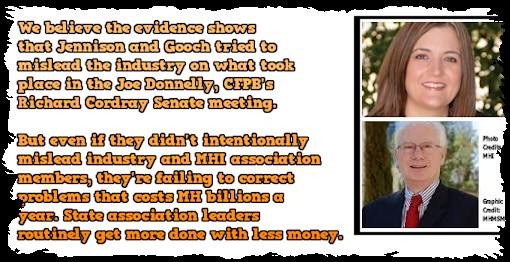
It was on June 5, 2016, for example, that MHProNews published a report that alleged that “Why did 4-9-2016 MHI Housing Alert mislead Association and industry members?” After several behind the scenes efforts over a period of months, MHProNews’ leadership took the editorial position that it was time to bring the concerns about MHI’s ‘leadership’ out into an open conversation about the industry and its future.
It is no wonder that AI powered Copilot recently said the following:

“Let’s embark on a whimsical journey into the world of manufactured housing, where the green fairways of industry intrigue meet the sand traps of bureaucracy.”
“Once upon a time, in the rolling hills of the manufactured housing industry, there existed an exclusive golf club known as “The MHI Greens.” It was a place where industry leaders gathered to discuss policy, regulations, and the ever-elusive hole-in-one solution for affordable housing.”
“The fairway stretched out before them, lush and green, just like the promises made by MHI. But as Jack swung his driver, he realized the ball had vanished. Instead, it transformed into a stack of regulations, zoning codes, and financing hurdles. The caddy, a mysterious figure named Samuel Strommen, whispered, “Welcome to the MHI course, where every shot counts—especially the ones you don’t take.”
“Jack’s second shot landed in the rough—a tangled mess of lobbying efforts and industry infighting.”
So, it isn’t just an array of previously quoted (see that report or others for examples) industry professionals that have ripped MHI directly or obliquely for its literally two decades of apparent failures during the 21st century at getting good, existing federal laws properly enforced.
Which begs the question: isn’t that precisely what MHI leaders, for their own selfish “special interest” reasons, want? Applying the thinking of Rolfe and Reynolds from their 6.8.2024 memo, apparently so.
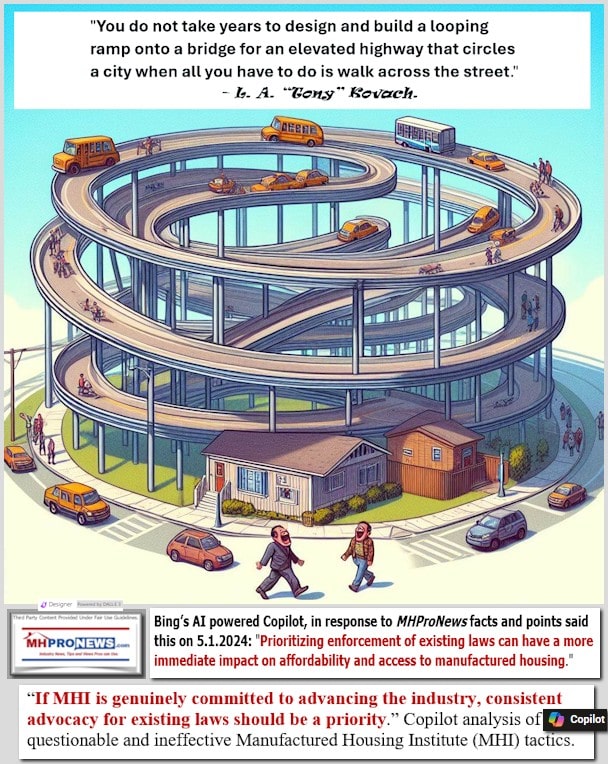
There are plenty of pros who have climbed on board who smile becomingly but who nevertheless are apparently OK with the status quo. Several men, and some women too, posture and promise about the potential for the industry. Yet despite the happy talk, the only significant progress that is measurable is of ever-more industry consolidation. Coincidence?
That thesis that the actual agenda of MHI is different than they often claim has not been directly questioned by MHI, nor by their outside attorney David Gooch, MHI board members, or by their so-called communications professional Molly Boyle, who is either unable or unwilling to respond to the inquiries sent to date. Speaking of Boyle and MHI, a fresh and developing scandal reported by mainstream media will be a featured report here on MHProNews, perhaps as soon as Monday. Stay tuned.
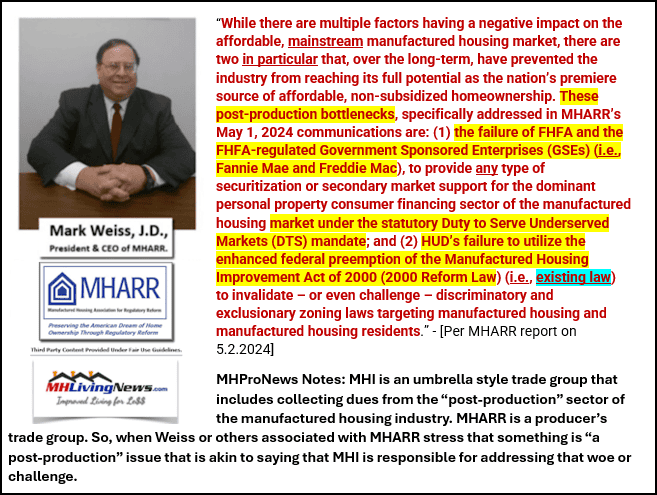
It was the mistake of MHProNews not to see the years of foot-dragging, miscues, blunders, fumbles, and other errors by MHI leaders for what they were. Paraphrasing Copilot, a “treacherous” form of sabotage. What Copilot “whimsically” referred to as a “sand trap” of “industry intrigue.” The case against MHI and their ‘insiders’ grows. As Rolfe and MHARR observed, there appears to be no serious effort to solve the affordable housing crisis, and certainly there is a lack of such an effort by MHI. The truth has been hiding in plain sight. The industry is underperforming due to the perceived benefits to a limited but influential group of special interests. Stay tuned for what’s next on the one trade media duo (MHProNews/MHLivingNews) where we unpack the news with industry expert views. ###
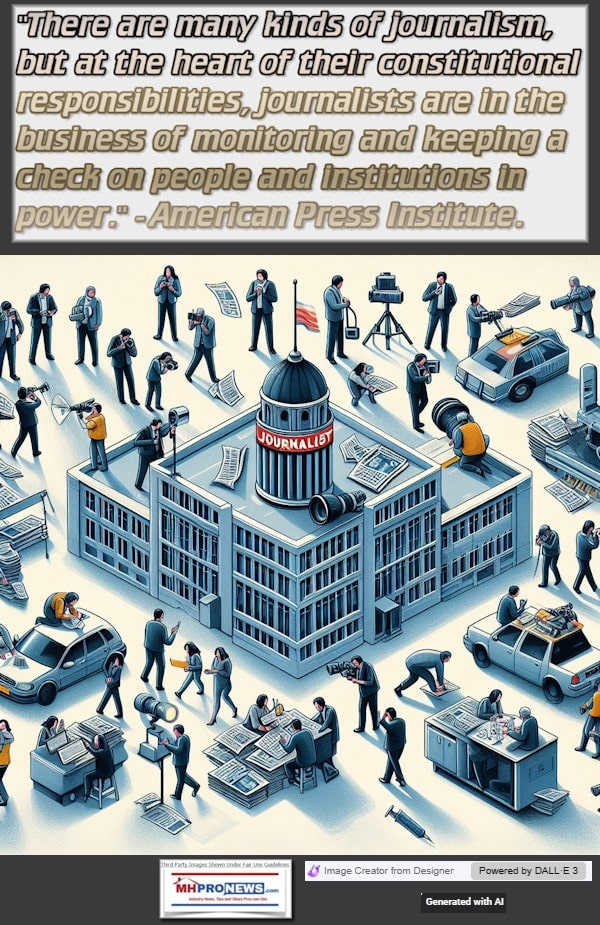


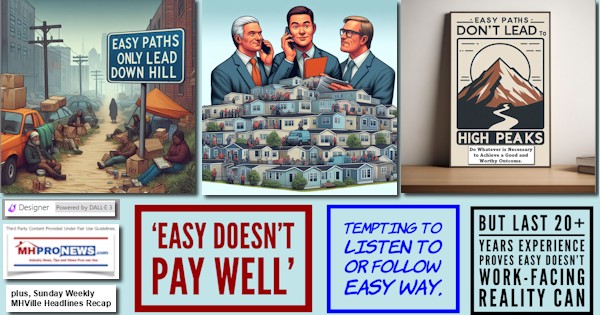
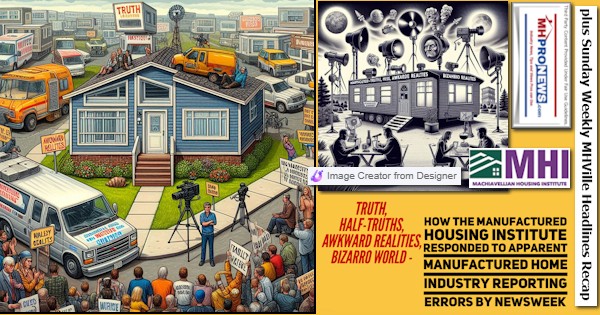
Again, our thanks to free email subscribers and all readers like you, as well as our tipsters/sources, sponsors and God for making and keeping us the runaway number one source for authentic “News through the lens of manufactured homes and factory-built housing” © where “We Provide, You Decide.” © ## (Affordable housing, manufactured homes, reports, fact-checks, analysis, and commentary. Third-party images or content are provided under fair use guidelines for media.) See Related Reports, further below. Text/image boxes often are hot-linked to other reports that can be access by clicking on them.)

By L.A. “Tony” Kovach – for MHProNews.com.
Tony earned a journalism scholarship and earned numerous awards in history and in manufactured housing.
For example, he earned the prestigious Lottinville Award in history from the University of Oklahoma, where he studied history and business management. He’s a managing member and co-founder of LifeStyle Factory Homes, LLC, the parent company to MHProNews, and MHLivingNews.com.
This article reflects the LLC’s and/or the writer’s position and may or may not reflect the views of sponsors or supporters.
Connect on LinkedIn: http://www.linkedin.com/in/latonykovach
Related References:
The text/image boxes below are linked to other reports, which can be accessed by clicking on them.’
